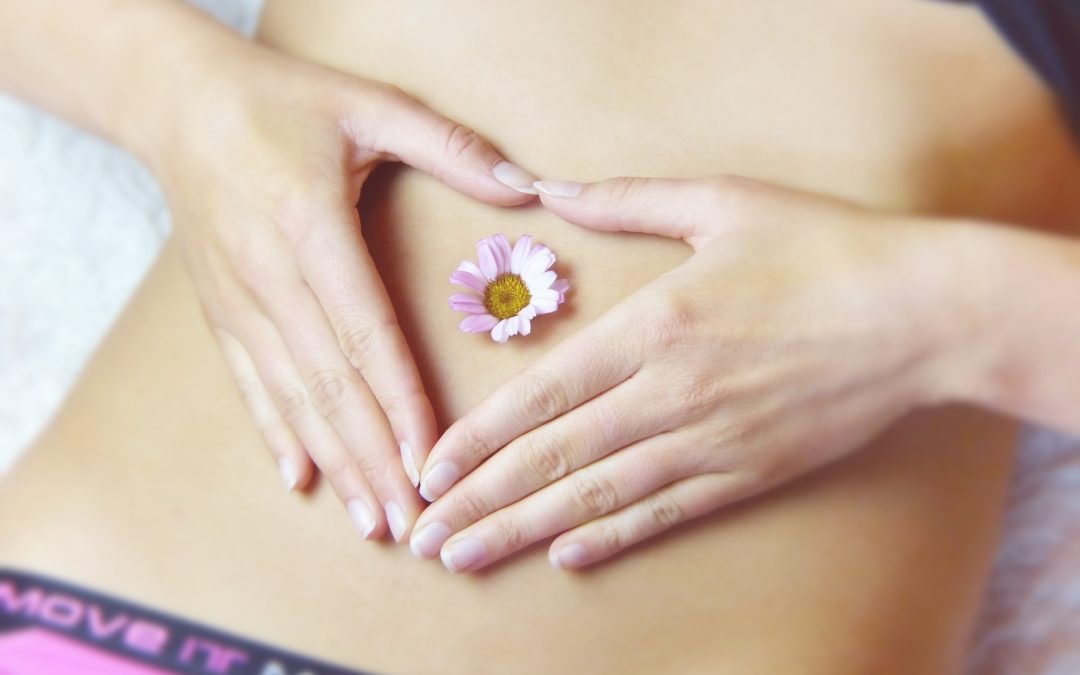Can endometriosis cause bloating? Well, not directly, but there absolutely is a connection between the two. That’s why there is a phenomenon amongst endo warriors that is so common that it has its own name: endo belly! And the great news is that you can address both things by looking at the same solution.
Endo belly typically refers to the very uncomfortable, bloated, distended belly that endo warriors commonly experience. Many women report looking 5 months pregnant, being unable to wear jeans or any fitted clothing, and experiencing pain and discomfort due to this bloating.
Now, bloating is not an uncommon symptom amongst many women, endo warriors or not. So many women experience bloating in relation to their period or just because they had a large meal. I’m here to remind you that while bloating may be very common, it does not mean it is normal.
In a normal, healthy digestive system and with normal, healthy hormones you should not experience bloating.
Why can endometriosis cause bloating?
Endometriosis is known as a condition where tissue similar to the endometrial lining grows outside of the uterus. So what exactly does this have to do with abdominal bloating? Why can endometriosis cause bloating?
Let’s look back at the endo-gut connection. Endometriosis is, at its root, a dysfunction of the immune system. 70% of the immune system lies in your gut. Therefore, gut health plays an enormous role in endo healing.
Basically, when you are experiencing bloating, it is your body sending a signal that something is off. So what is that something? Well, there is no one answer, but options can include low stomach acid (yes, really! Don’t let the ubiquitous antacid commercials fool you. Low stomach acid is an extremely common issue I see with my clients) as well as low pancreatic enzymes, dysbiosis (imbalance of gut bacteria), or possibly SIBO (a bacterial overgrowth in the small intestine) or food intolerances/sensitivities.
This still leaves a lot of options and there is no one-size-fits-all answer. That is why with my clients, I often like to use a GI-Map test as well as an MRT food sensitivity test, the most accurate tests of their kind on the market. The GI-Map is a functional stool analysis test which gives an inside picture of exactly what is happening in your gut so that we know exactly what to address without potentially causing further damage with guesswork.
How do you address these gut issues?
When you are looking to address gut issues, especially in the case of endo which often comes with more severe symptoms, I do highly recommend working with a practitioner who is highly specialized in this area.
As I mentioned before, guesswork can end up causing more harm than good.
What this can look like when I work with my clients include supplementing with HCl while simultaneously supporting your body’s natural production. It may also mean supporting enzyme production and oftentimes an eradication protocol for overgrowth of bacteria as well.
Your gut is like a garden
Inside of your gut, there are actually trillions of microorganisms, from bacteria to parasites to fungi. Gross, I know, but they have a purpose. These microorganisms help you to digest food that your body can’t handle on its own and also offer protection to your gut lining. They’ve got your back!
At least, they should.
There are certain types of these microorganisms that are opportunistic and can actually cause harm as well as painful or uncomfortable symptoms including bloating, diarrhea or constipation, abdominal pain, and so much more. And yes, there is a strong connection between this imbalance of microbiota and the endo pain and fatigue you may experience as well.
So the goal when addressing dysbiosis and SIBO (terms for when the “bad bacteria” outnumber the good) is to reduce the number of opportunistic bacteria while simultaneously increasing the number of beneficial flora.
That is where many people can run into trouble, because eradication alone may only leave you feeling worse. You want to have the good guys running around looking out for you!
Can addressing bloating also help my endo pain?
Absolutely! Here is the short version of this: immune dysfunction like you see when there is an imbalance in your gut causes inflammation. Inflammation in turn causes pain. No, the endo lesions may not be on your gut directly (although sometimes they are), but addressing the immune function and inflammation still plays a huge role.
Remember, your systems do not function in their own little bubble, separate from each other. I know that in school we all learn that there are different systems like your digestive system and reproductive system that all have their own function in your body.
At the end of the day though, they are all parts of the whole. The function of each system in your body affects all the other parts and systems as well. This is why we have to think of your body as a whole and steer away from just addressing your female parts.
I said it a thousand times before, but endometriosis is a full body disease and it should be supported as such. Looking to your gut is the perfect place to begin and can help to bring you relief from so very many of your symptoms.
Final thoughts on how can endometriosis cause bloating
Let’s face it, bloating is highly uncomfortable and can even be painful. Many women share that they get so bloated that they look 5 months pregnant and that can be so challenging emotionally, especially if you are in a boat where you have struggled with fertility and have had trouble actually getting pregnant.
Bloating is amongst those symptoms that are so very common that everyone just brushes them off and deals with them. I’m here to remind you that you don’t have to.
You can live a life free of bloating and you absolutely should!
This is the type of work that I feel so passionate about helping women with inside of my 1:1 coaching program, Thrive With Endo. Click here to learn more and apply today!
Much love!
Other Articles You Might Enjoy:
Fatigue and Endometriosis: What Can We Do?
The Endo-Gut Connection
Elimination Diet for Endometriosis
Endometriosis Diet for Fertility
References:
Nutritional Therapy Association (2021). Digestion Module Materials [Video and PDF Documents].
Restorative Wellness Solutions (2022). Mastering the Art and Science of Gastrointestinal Healing Materials [Video and PDF Documents].
Weatherby, Dicken, ND. (2004). Signs and Symptoms Analysis from a Functional Perspective. Jacksonville, OR: Bear Mountain Publishing.
Svensson, Agnes; Brunkwall, Louise; Roth, Bodil; Ortho-Melander, Marju; Ohlsson, Bodil. (2021). Associations Between Endometriosis and Gut Microbiota. Retrieved from: https://www.ncbi.nlm.nih.gov/pmc/articles/PMC8289757/
Luscombe, Georgina M; Markham, Robert; Judio, Mirari; Grigoriu, Ariadna; Fraser, Ian S. (2009). Abdominal bloating: an under-recognized endometriosis symptom. Retrieved from: https://pubmed.ncbi.nlm.nih.gov/20085682/


